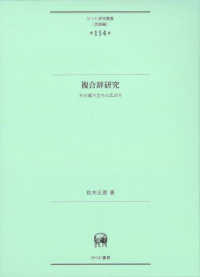- ホーム
- > 洋書
- > 英文書
- > Politics / International Relations
Full Description
This open access book focuses on the meanings, agendas, as well as the local and global implications of bioeconomy and bioenergy policies in and across South America, Asia and Europe. To what extent does the bioeconomy affect existing socio-ecological inequalities in rural areas?






